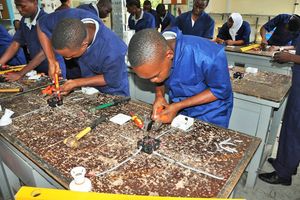Fake printer cartridges on sale: HP

Beware, fake print cartridges are on sale in Tanzania. PHOTO|FILE
What you need to know:
According to a statement by HP to BusinessWeek, last year over 3,000 fake toner cartridges were seized in Tanzania and 2,000 in Kenya.
Dar es Salaam. The global supplier of ICT accessories, HP, has warned that thousands of fake printer cartridges are on sale in East African countries.
According to a statement by HP to BusinessWeek, last year over 3,000 fake toner cartridges were seized in Tanzania and 2,000 in Kenya.
According to the statement, although counterfeit print cartridges may look like genuine HP print cartridges, they do not provide customers with the high print quality, proven reliability, and consistent yields that one would expect from a genuine product.
Some of the potential risks of using counterfeit print cartridges include poor quality print-outs, reduced page yields, print cartridges which fail prematurely or do not work at all and printer damage which may require repair.
Other risks include interruption of printing infrastructure and workflow, as well as potential invalidation of hardware warranties.
Poor or inconsistent print quality is a primary indicator of non-original products, according to the statement.
“In addition to providing our customers with information and tools to assist them in properly identifying genuine cartridges versus counterfeit cartridges, HP also investigates suspected counterfeit activities and then partners with law enforcement and customs officials around the world who then perform seizures and make arrests,” the statement further reads.
“The resulting penalties and sentencing of criminals are then administered through local criminal justice systems.”
Regarding identification of genuine toner cartridges, the HP document outlines unique features as specific location of the hologram label, air-proof package of the cartridge inside the box, protective tape in cartridge and production codes on the cartridge casing and on the box.
Since most users of ICT devices are not aware of ICT counterfeits, there is a strong need for disseminating correct information on how to identify counterfeit ICT products, according to HP report.
An assistant lecturer of ICT at the University of Dar es Salaam’s Institute of Development Studies, Mr Hezron Makundi, says the problem of fake computer accessories is not unique as it occurs in all types of products manufactured globally.
It is up to manufacturers to collaborate with responsible authorities for curbing distribution of fake goods, says Mr Makundi.
“Manufacturers of computer accessories must collaborate with responsible authorities for arresting dealers of fake computer fixtures.”
According to him, already the e-government department under the ministry of State in the President’s Office (Public Service Management) is preparing a law for curbing distribution of fake ICT products.
He says counterfeits are accentuated by uncontrolled under-licensing of manufacturing of computer accessories to various producers worldwide, particularly for those countries struggling to adopt new ICT technology.
“Computer parts are normally manufactured by different factories globally, which in turn may create loopholes for piracy.
The case in point is the trend that took place in China before becoming a member of WTO [World Trade Organisation]. China became a member of WTO in 2001.
Before that time there were a lot of petitions in the WTO against Chinese violation of intellectual property rights for ICT products,” he says.
According to him, such kind of piracy does not occur in Tanzania because the country does not possess factories for manufacturing computer parts.
The WTO is the global organisation responsible for controlling piracy and mediating the global disputes based on violation of intellectual property rights.
The senior public relations officer for the Tanzania Bureau of Standard (TBS), Ms Rhoida Andusamile, said recently that TBS was not responsible for controlling the distribution of fake ICT products. The work is done by the Fair Competition Commission (FCC).
FCC Public relations manager Frank Mdimi confirmed that there has been routine collaboration between FCC and HP in curbing entry and distribution of fake computer accessories.
“We have been working closely with HP on this issue. This problem is complicated to the extent that it requires routine collaboration. Even in Tanzania, people have been making fake ICT products, especially ink for toner cartridges.”
He cites arrests of some fake manufacturers of toner cartridge ink on May 12 and 13 in Dar es Salaam.
“We have a special department responsible for controlling distribution of fake computer accessories. Since this is a global problem it requires enough time and concerted efforts to deal with.” FCC welcomes members of the public to furnish the watchdog with reports on fake computer accessories for legal actions to be taken.
FCC has not only been working to control fake distribution of fake computer accessories, but also other electronic counterfeits such as mobile phones and photocopy devices, according to him.
Early last month a team of HP experts from Kenya organised a one-day familiarisation seminar to stakeholders in Dar es Salaam for alerting HP customers on the danger of counterfeit toner cartridges that are in the market.
One of the experts, Mr Peter Ngugi, said 11 million such counterfeit products had been seized in Africa.
Mr Ngugi who is HP supplies and channel manager for West, East and Southern Africa said HP has been serious about protecting its trademarks and its brand through investigations that span borders to disrupt the international trade of illicit products.
According to him, HP is also an active member of a number of not-for-profit international brand owners’ associations worldwide, supporting governments and law enforcement authorities.
Fake ICT products impact negatively on businesses and global trade through lost revenue, damage to brands and the negative effects on hard-earned reputation and consumer confidence, according to him.
Another ICT expert, Mr Peter Mbiti, who is also a Kenyan, says HP, which is the biggest supplier of ICT accessories in East Africa, has been investing heavily in research and development to lessen distribution of fake computer accessories.
Mr Mbiti says HP has been providing solutions to new styles of ICI to curb the distribution of fake products. “We invest over $3 billion every year worldwide in research and development,” he says.
He speaks about HP’s priority on protecting customers and its brand, HP hopes to raise awareness on the impact and consequences of counterfeit trade.
On Wednesday last week, HP organised an Anti-Counterfeiting Conference for African countries in Abuja, to help fight against fake products and fraudulent marketing while protecting customers from being cheated by illegal scheming.
Reports show that as the global trade in counterfeit goods is growing, Africa, particularly Nigeria is increasingly being targeted as a market for counterfeit merchandise, according to an HP report circulated at the Abuja summit.




